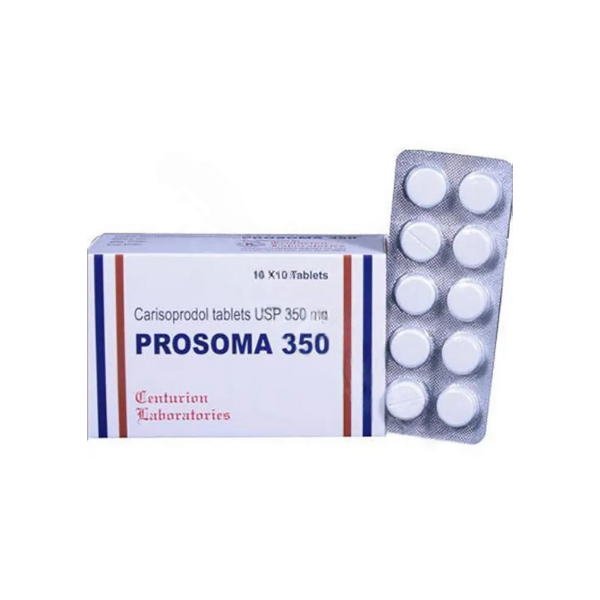Prosoma 350 mg: A Comprehensive Guide to Musculoskeletal Pain Relief
Prosoma 350 mg is a prescription medication designed to provide short-term relief for acute musculoskeletal pain. The active ingredient, carisoprodol, is a centrally acting muscle relaxant that helps alleviate discomfort resulting from muscle strains, sprains, and spasms. This medication is commonly prescribed for individuals suffering from pain caused by injury or other musculoskeletal issues. It should be used under the guidance of a healthcare provider and is typically recommended for short-term treatment, usually not exceeding two to three weeks.
Key Features
- Active Ingredient: Carisoprodol 350 mg
- Dosage Form: Oral tablets
- Manufacturer: Centurion Laboratories
- Packaging: Available in strips containing 10 tablets
- Controlled Substance: Yes, classified as Schedule IV
- Storage: Store at room temperature (20–25°C or 68–77°F)
Indications and Uses
Prosoma 350 mg is primarily indicated for the relief of acute pain due to musculoskeletal conditions, including:
- Muscle strains
- Sprains
- Muscle spasms
- Back pain
- Neck pain
When prescribed, it is typically used alongside other therapeutic measures, such as rest and physical therapy, to promote recovery. This medication helps individuals manage the pain during the healing process, enabling them to perform day-to-day activities more comfortably while they recover.
How It Works
Carisoprodol, the active component in Prosoma, works by inhibiting pain signals sent to the brain. This mechanism reduces discomfort and provides relief from muscle pain and spasms. After ingestion, carisoprodol is metabolized into meprobamate, which has sedative and anti-anxiety properties, contributing to its muscle-relaxing effects. The onset of action is generally quick, with noticeable effects usually occurring within 30 minutes, and lasting for about four to six hours.
Dosage and Administration
The typical adult dose of Prosoma 350 mg is one tablet, taken three times a day and at bedtime. However, the exact dosage may vary depending on the individual’s specific health condition and response to the medication. It is essential to follow the prescribed dosage carefully to avoid the risk of side effects and to achieve optimal results. Due to the potential for dependence with prolonged use, Prosoma is typically recommended for short-term use, usually no longer than two to three weeks.
It is crucial to consult your healthcare provider before starting or discontinuing this medication to ensure that it is used appropriately.
Possible Side Effects
Like all medications, Prosoma can cause side effects. The most common side effects include:
- Drowsiness
- Dizziness
- Headaches
- Nausea
- Stomach discomfort
These side effects are usually mild and go away on their own. However, if they persist or worsen, it’s important to consult your doctor.
Serious Side Effects (Rare)
In rare cases, more serious side effects can occur, which require immediate medical attention. These include:
- Seizures
- Hallucinations
- Rapid heart rate
- Muscle stiffness or loss of coordination
- Fever, sweating, or shivering
- Nausea, vomiting, or diarrhea
If you experience any of these more serious symptoms, seek medical help immediately.
Warnings and Precautions
Before using Prosoma 350 mg, there are several important precautions to consider:
- Dependence and Tolerance: Prosoma has the potential for physical dependence and tolerance, especially when used for extended periods. It is essential to follow the healthcare provider’s instructions and avoid using this medication for longer than necessary.
- Alcohol: Consuming alcohol while taking Prosoma can increase the risk of serious side effects, including excessive drowsiness, dizziness, and respiratory issues. It is advised to avoid alcohol during treatment.
- Driving and Operating Machinery: Due to its sedative effects, Prosoma can impair your ability to drive or operate heavy machinery. Patients should exercise caution and avoid such activities until they know how the medication affects them.
- Elderly Patients: Older adults may be more sensitive to the sedative effects of Prosoma, which increases the risk of dizziness, confusion, and falls.
- Pregnancy and Breastfeeding: The safety of Prosoma during pregnancy and breastfeeding has not been fully established. Pregnant or breastfeeding women should consult their doctor before using Prosoma to weigh the potential risks and benefits.
Drug Interactions
Prosoma 350 mg may interact with other medications, which can either diminish its effectiveness or increase the risk of side effects. Some of the significant interactions include:
- CNS Depressants: Combining Prosoma with other central nervous system depressants, such as opioids, benzodiazepines, or alcohol, can enhance the sedative effects and increase the risk of respiratory depression and other severe side effects.
- Other Medications: Always inform your healthcare provider of any other medications or supplements you are taking, as they could interact with Prosoma.
Special Considerations
Prosoma 350 mg is a prescription medication, and its use should be guided by a healthcare provider who can monitor for potential side effects and interactions. Given its potential for dependence and misuse, it is important to use the medication as directed and for the shortest duration necessary to manage acute pain.






Reviews
There are no reviews yet.